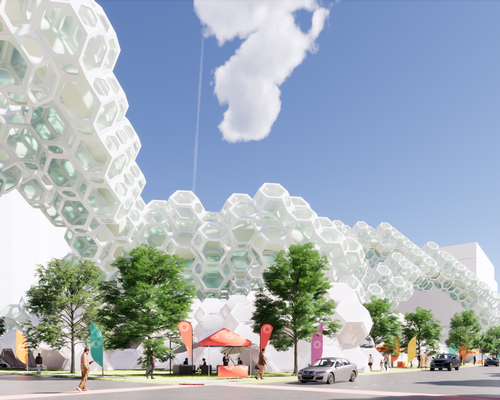04 Oct 2019
Radical Innovation Awards 2019 to showcase hospitality disruptors
BY Stu Robarts

A concept for connecting travellers to remote destinations using defunct rail lines, the world's tallest modular hotel and collapsible modular building units make up the shortlist for this year's Radical Innovation Awards for disruptive ideas in the hospitality sector.
The awards, which are conceived to encourage disruptors from around the world to develop ideas for progressing the industry, are now in their 13th year. This year's finalists are Infinite Explorer by SB Architects, Volumetric High-Rise Modular Hotel by Danny Forster & Architecture and Connectic by Cooper Carry. The concepts, selected by a jury of hospitality and design experts, are described as follows:
Infinite Explorer by SB Architects
Infinite Explorer is a hospitality concept that helps travellers connect with remote destinations using the American West’s defunct passenger rail lines which now span the nation. What were once bustling railways are now silent and forgotten vestiges of our past. Many of these railways span untapped, truly breathtaking, locations, but provide no footing for hospitality development.
The Infinite Explorer provides a unique opportunity to embrace and transform the existing infrastructure of these underutilised spaces, making the unreachable, reachable. Train travellers usually only capture a glimpse of the immense beauty that passes by outside their window, but imagine if you could step out of your cabin into the wilderness to feel, touch, and smell it? Each stop along the route is unique and designed with an immersive program of activity, including outdoor adventures, wellness and dining; designed to astound, delight and capture the guest’s imagination at every turn.
The Infinite Explorer is a one-of-a-kind hospitality experience. One train, infinite possibilities.
Volumetric High-Rise Modular Hotel by Danny Forster & Architecture
This Volumetric High-Rise Modular Hotel will be the world's tallest modular hotel and one of the most stylish, combining modular efficiency with architectural flair. AC by Marriott at 842 6th Avenue, New York City, will be the tallest modular hotel in the world when it opens in early 2020. But it won’t just be a step up for modular design, it will be a step forward.
The building leverages the advantages of modular construction, uses cutting-edge proprietary technology to address potential drawbacks, and, most importantly, put to rest the idea that a modular building can only be the sum of its factory-made parts. It’s stylish and architecturally expressive. And yes, 80 percent of the building's square footage will be shipped in—precisely constructed and complete down to the curtains, TV, sconce and even art—from a factory in Poland.
The perfect marriage of modular construction and inventive architectural design, this Manhattan AC points the way to the future by using accelerated design processes through VR software and off-site quality control to streamline the building process for builders anywhere in the world. DF&A and its tech partner patented a “Time Machine” technology that trains 3D cameras on each module at five different points in the construction process, so that clients, contractors, and architects can keep an eye on what’s being built. Furthermore, this technology syncs those images to the VR plans, which means off-site stakeholders and on-site factory workers can compare what a module looks like at a particular stage to what it should look like.
Connectic by Cooper Carry
Connectic employs modular construction techniques to fill underutilised spaces by way of collapsible, modular units that are flexible and adaptable to respond to a variety of environments. This concept could be used to build a pop-up hotel in remote areas or to help solve problems of space and density in urban cores.
Interstitial spaces between buildings, parking lots, forgotten pocket parks, and above buildings offer an opportunity for hotels of the future to use Connectic’s model to increase the volume of available keys and amenities and connect neglected spaces to existing hotels. This would become an aggregation that can swell and shrink as needed. A collective of modules that are at once collapsible and reusable. Conflating multiple revenue streams into a single solution. And, a kinematic proposal to temporary events.
In addition to the three professional finalists, the jury selected a student winner. Rooftop Hotel Gardens by Ruslan Mannapov and Airat Zaidullin from Kazan State University of Architecture and Engineering (KSUAE) in Russia is a concept that places pods on top of hotels to give guests the chance to experience the skylines of cities around the world.
The award ceremony takes place at the New Museum in New York City on October 16th. The three finalists will pitch against each after which a live audience will vote to determine the winner and the runner-up, who will receive prizes of $10,000 and $5,000, respectively.
The winner and runner-up from last year's finalists were an autonomous travel suite and an aquaponic hotel experience.
Close Window